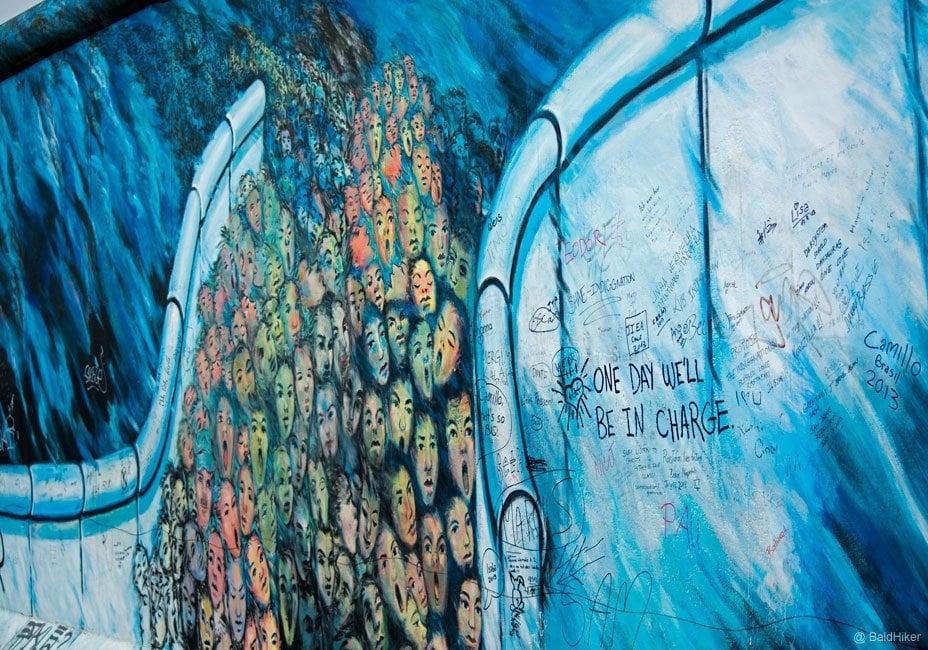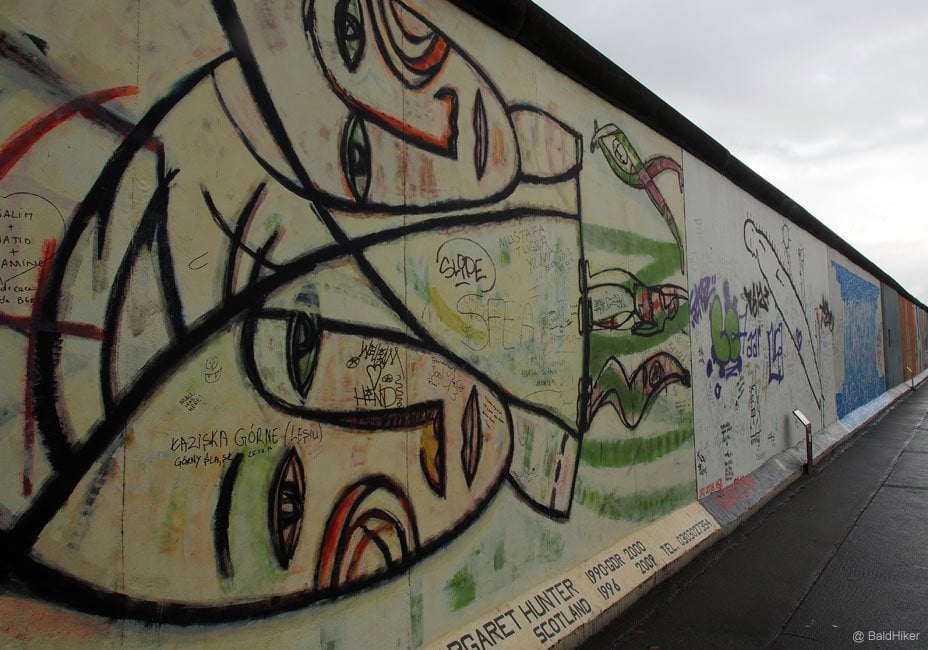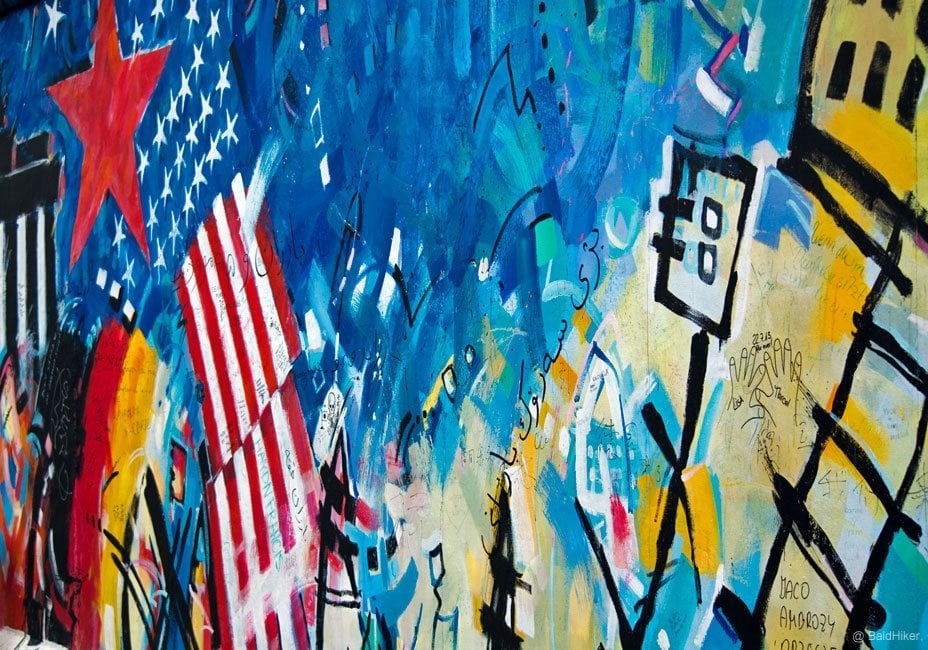The East Side Gallery is a renowned historic landmark in Berlin, Germany, located on the remnants of the Berlin Wall. This open-air gallery stretches for 1.3 kilometers and is the largest remaining section of the wall.
It showcases over 100 captivating murals painted by artists from around the world, symbolizing freedom, unity, and hope. The East Side Gallery attracts visitors from all over the globe, offering a glimpse into the city’s tumultuous past and celebrating the triumph of the human spirit.

The Fall Of The Wall
The greatest symbol of the Cold War was the Berlin Wall – a 140 km long wall that was built in 1961 by the Soviet backed East German Government to stop the exodus of East Germans to the Western sector. There is a long history to the wall – including the killing of people trying to cross the ‘killing zone’ between the two walls to escape to the west.
There are many and complex reasons behind the fall of the Wall as the Soviet block lost power – this was partly driven by the crude oil glut in the 1980s and the subsequent drop in the global oil price and partly by political leadership from Gorbachev and his policies of glasnost (“openness”) and perestroika (“restructuring”).
There was also Western pressure including from Ronald Reagan when he was US President but also from more unlikely sources like David Bowie, Bruce Springsteen and David Hasselhoff! There is much debate about how much influence these interventions had.

Finally, as the Soviet block weakened, Hungry and Czechoslovakia opened their borders thousands of East Germans where able to escape to the west. This put yet more internal pressure on the East German Government.
The wall finally was pulled down in November 1989 when people power took over and the East German Government collapsed. In the end it came about very suddenly an East German news broadcast stated:
“This 9 November is a historic day. The GDR has announced that, starting immediately, its borders are open to everyone. The gates in the Wall stand open wide”.
Seemingly this was a misinterpretation as it was meant to be an announcement until the next day. There wasn’t time to tell the guards on the Wall what was happening so when the people of East Berlin took to the Wall and walked to the Gates the guards didn’t know what to do.
With no orders to shoot – or not to shoot – the guards didn’t act and the Wall was breached and then slowly torn down. Those of you too young to remember 1989 may not realise what a time it was – there was student protest in Tiananmen Square in Beijing, China and then their brutal repression on the 4th and 5th June that year this was followed by the fall of the Berlin Wall and then, in 1991, the collapse of the USSR.
The East Side Gallery
Two months after the official fall of the Berlin Wall, in November 1989, a project called the ‘East Side Gallery’ was started. An initiative that involved over a hundred artists who were asked to make murals on a remaining stretch of the Wall in East Berlin.
It was the first time in history actually that the East side of the Wall that was painted on, something that was not possible before.

During a period of six months the wall was decorated with brightly colored paintings from artists from all over the world.
If it wasn’t for these paintings, this part of the wall would probably have been knocked down as well. It’s one of the three still remaining sections of the Berlin Wall and used to be a section of the former inner Wall.

Over the years, the irreversible march of time has affected the artworks. The weather, car exhaust fumes and souvenir-hunting tourists have left their mark, damaging the paintings.
To try to save the artworks a large-scale restoration took place in 2009. Twenty years after the fall of the wall hundreds of paintings where restored or repainted.

Despite all the efforts to preserve the wall and the artworks the project is still at stake…. Sections of the wall have been removed to give access to the river Spree from the O2 Arena and to create a passage to apartment buildings that are planned on the riverbank.
But still the East Side Gallery is believed to be possibly the largest (1,3 km) and longest-lasting open air gallery in the world. Up till today it is seen as an international monument of freedom.
I hope you will enjoy the walk along the wall with me, I have placed the artists name below some of the photos we took in case you would like to look further…

Russian-born artist Gamil Gimajew’s mural is an explosion of colors, words, swirls, hidden faces and emotions.


Thierry Noir, who was born in France, came to Berlin in 1982 where he lived in a former hospital close to the Berlin Wall. After two years living closely to the wall he started to paint it.
As this was a highly illegal act it had to be done at night and with great speed, simple patterns and colors were adopted defining Noir’s style. When the wall fell his simplistic paintings became a symbol of freedom. So it’s no coincidence that he’s one of the East Side Gallery artists.





The Walljumper jumping from West to East, from Kreuzberg to Friedrichshain, in a symbolic gesture of bringing freedom.

A last look across the river Spree, time to say goodbye to Berlin. We’re on our way to the airport. Venice will be our next stop…


More From Berlin:









Thanks for sharing Cindy! really great picts
Art and emotions. a piece of all us in that wall…. beatuful pics, thanks for sharing
Beautiful pictures! I love that they are able to turn the wall into a celebration.
Really fascinating! a way to highlight a part of our history that is still there on that wall.
Thank you Mark for your kind comment!
A fascinating look at Berlin. Unfortunately the graffiti has the effect for some people of removing some of what the wall stood for.
Thanks James, I know what you mean. But if it hadn’t been turned into a gallery it probably would have totally disappeared in time….